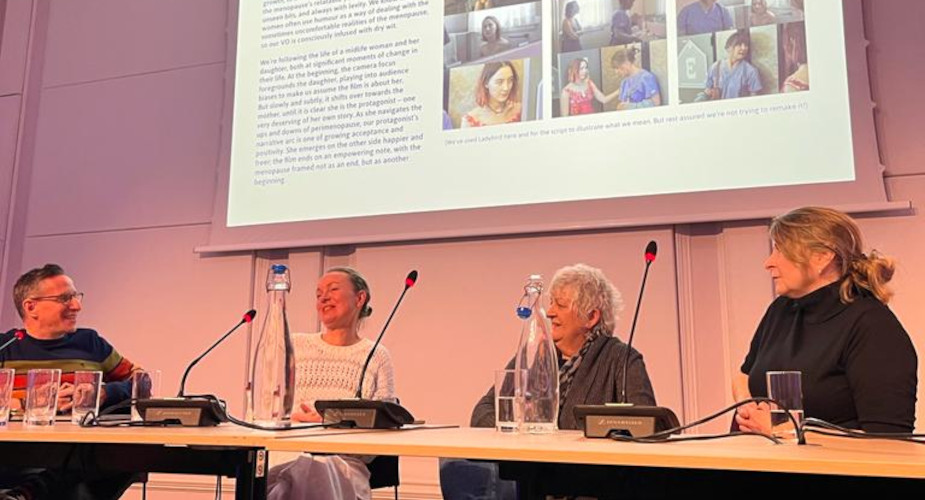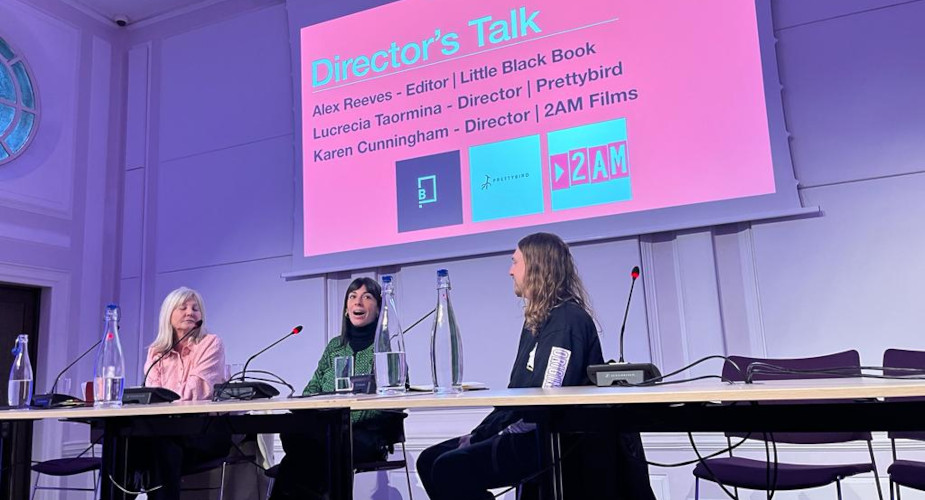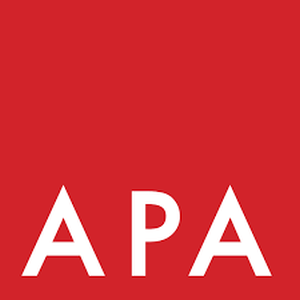
What I Learned at the APA’s Producers Masterclass

“The producer is essentially the captain of the ship. They’re there to guide, but they also need to have all the skills of those with them on the ship.”
This is what Leonie Ellis, freelance executive producer at The Mill told me when asked what a ‘producer’ means to her in the industry today. At that moment, she had just come out of the editing suite where one of the groups of the APA Masterclass 2023 was learning about the craft firsthand. On the third day of the class, the students ran around Soho and the city, visiting the most important production and post houses of the industry, to see all the people behind their favourite commercials and films at work.
But let’s bring this story to its very start. Attending the APA Masterclass 2023 was nothing short of enlightening and totally unexpected. The nearly 150 students that I participated alongside came from an incredible variety of professional backgrounds, not at all limited to production. For instance, on the first day of the course, a junior assistant strategist at Stink spoke to me about how learning the different facets of the producer’s profession is valuable to anybody in the production chain and especially to her as a strategist. Each participant I spoke to expected the course to help them with different goals, but they all ultimately understood the importance of the producer’s duty and how it seeps through the filmmaking pipeline. Most importantly, they all knew there is something more to be understood about it - some secrets that need to be taken out of the late night budget calls, the dark editing suites, the endless email threads and the bottomless pit of insurance documents, need to come to light, so that everybody understands why the producer is the ‘steerer of the ship’.
At nine in the morning on the Monday, the first talk hinted at exactly that. The omnipresent glow of the producer’s knowledge about what is being made, how it’s being made, and what makes a film bad, ‘okay’ or excellent. Almost immediately after the masterclass started, the students were thrown in the deep end and asked to produce a short film in 15 minutes, with the brief: ‘Why am I taking this course and what do I hope to get out of it?’. Immediately, issues of creative tension, deadlines, and tech usage came up within the groups. And even though some were confident they’d created a masterpiece and others weren’t so sure, the sheer range of approaches to the same one-sentenced brief was incredible. The fact that the group I was working with ended up producing a stop-motion short about our talking water bottles might give you an idea of the scope of imagination we were working with.
So, regardless of if the groups were made up of strategists, ad agency reps, or actual aspiring producers and directors, they all gave it their best, kicking off the week with fresh ideas and a first-hand experience of the chaotic race a producer enters once a brief is thrown at it.
During the initial talk, Andrew Levene, managing director at Stink Films London, spoke about the need for some creative tension on a project. “Not everybody needs to be a yes-man,” he said when discussing the ways in which the groups worked together. “Creative tension is what births the best work.” Speaking to Margo Mars and Ella Sanderson, founder and producer respectively at creative content studio Lief, as well as Trish Russel, creative production partner at AMV BBDO, the panel shared their unique experience with creating Tena’s ‘The Last Lonely Menopause’ campaign, and discussed what the producer’s role is on major projects like that one.
Which, as it turns out, is a live channel between directors and agency… And between the set and everything else. Margo reflected back on the development of the Tena ad and the final shot, in which we see a daughter leaning on her mother’s shoulder in a public swimming pool - a shot which the director suddenly decided to add at the very end of the film, without it being scripted or expected. In turn, this entirely changed the timeline of the shoot, the rent on the public swimming pool and the times in which they could film in it - all issues that were then shifted onto the producer’s shoulders, solely because of a tiny turn in the creative.

And it is not to say that those won’t happen - in fact, the one guarantee I learned about production from the masterclass is that the unexpected is the only certain thing about production! Creativity has a flowing nature, and creatives, although professionals, work with concepts that need to mix and match in ways viewers don’t understand upon first view of an ad or a feature film. The producer’s job is to take those concepts, however they might change in the course of events, and seamlessly blend them into the perfectly preconceived plan, so that at the end of the day, the viewer never finds out. Andrew closed off the talk with a quote that I believe everybody in the room will remember: “Trust, honesty and creative reliability are liquid gold in the production world.”
Next up, our own EMEA editor Alex Reeves led a panel discussion with Lucrecia Taormina, director at Prettybird and Karen Kunningham, director at 2AM Films, about the relationship between directors and producers, and why directors should not be pigeon-holed.
When it comes to the director-producer partnership, they both agreed that care is paramount. “Care is quite rare,” added Lucrecia, “Lots of producers produce, but many don’t care. You need to feel like you’re in the trenches with them.” To her, the producer needs to be able to throw themselves into battle to protect the creative and the director. If the shot isn’t ready - make it work. Tick the boxes. “My job as a director is not to make the producer’s life easier, but harder. We need to push each other,” she said. And however horrifying that might have sounded to a room of aspiring producers, it remains true. “You’re my partner as my producer. If you’re good, I will hold on to you for dear life.”
Karen, as somebody who has produced as well as directed throughout her career, agreed wholeheartedly. “Are producers all about money? Not at all. A good producer can be extremely creative and become the other half of the director. It is a creative partnership,” emphasised Karen, “not a money partnership. They need to believe in you, the director, because often they are your voice.”
At this point it was clear - the APA Masterclass and bringing all of these industry voices together isn’t just about understanding the depth of the producer’s role. It isn’t only about what they do, but also what they should strive to be, and how deep their creativity needs to run and intertwine with their quick thinking and endless solutions. Producers need to be the people who come up with those solutions, who reach deep into the director’s head to see through their eyes, and also have the skillset to bring that creativity back into the real world and ground it - to make it real and tangible. They are, essentially, the link between imagined and real, and must carry the huge responsibility that comes with the job.
“Oftentimes the director doesn’t even have an idea how the producer fixes things,” said Lucrecia. But the most important thing is, they need to get fixed. “My job is not to worry about the production, my job lies in attacking the shot-list,” she added. Which makes her producer’s job to work in the shadows, making sure that every shot is executed perfectly, any wrong turn is mended, and not one penny over budget is spent in the process. Sounds simple, right? No.
Not only is the producer’s role to support their director, which can sometimes mean pushing back against something that’s not as great as it should be, but it is also to be a diplomat. Karen said that she needs to be able to fully trust her producer. “Don’t be the ‘computer says no’ person. Be the creative person,” she added.

Later, lead tutor Jenny Beckett from Partizan and Ella More O’Ferrall, head of production at Partizan broke down a script by asking two questions that every producer needs to ask: Is it doable for the time? And is it doable for the project? Cue a flashback to the morning when people were scrambling to fit one-day long ideas into a fifteen minute deadline.
Three key words came to Jenny and Ella when explaining how a producer should be looking at a script: “Consider, consider, consider.” After a script has gone past its producer, it should ideally go from black and white to looking like a page off a kid’s colouring book with all the colour coded highlighting that will happen. “Just when you think you’ve thought of everything possible, more things will come up,” explained Jenny and Ella. “You thought about the talent and when it’s available? Great, now the agency wants you to handle their travel too. Everything has to be made note of and not only that, but also liaised with the director, who will undoubtedly have so many things to say about it.”
Ultimately, it seems that there will be some level of argument to everything a producer does - especially when breaking down a piece of creative work in a ‘logical’ way, considering logic looks different in people’s heads. However, the producer is the one who opens the wallet, as well as the one in charge of the calendar. So, what is most economical, especially when looked through the prism of how many people are involved, will always win. How can you group as many shots and locations together as possible? How can you lump talent together? If you need equipment, how can you make sure you exhaust its usage in the same day? Those are all questions that will be answered if you look correctly at your script and pay notice to the details.
There seems to also be a sense of ruthlessness to how a producer does their job. They are the ones who have to put their foot down and say ‘this is actually impossible’ or ‘this needs to be changed’ in order to pass legislation (legal working hours anyone?), but also in order to be able to pay for everything. Producing is not an exact science, but it requires very exact results.
Speaking of working hours and calendars, lead tutors Jeremy McWilliams from Bang TV and Paulette Caletti from Prettybird took the students on the exciting journey of making your schedule work, an area in which the producer reigns supreme. “The schedule is the one most vital part of the production and the entire framework of how the shoot will come together,” said Jeremy. Insurance brokers will probably beg to differ on the ‘most vital part’ point, but it seems that everything is vital in production. “More than any single thing, a good schedule will get you over your imposter syndrome, because it proves that you know what you’re doing - it shows you’ve thought of everything,” he continued. “Putting together a schedule and a budget might be the only time during the whole production that things are going perfectly.”
And during the scheduling process, Jeremy and Paulette explained, producers are essentially mimicking any other simple schedule we all encounter in our lives - trains, planes, weddings, simple week days. It is what makes us all adequately prepared. Except in this schedule the two vital parts are sequence and parallel, meaning that ‘logic’ comes into play again so that everything is in a logical sequence, and parallel meaning how many things can happen at once. While considering these two vital parts of scheduling, producers will most probably keep going back to their research, their permissions (third party interventions not under the production’s payroll) and approvals (internally from directors, agency, clients).
Jeremy left the students with this important piece of advice: “When doing the schedule, please do not wait for anything. Just do it. Just get on with it.”
So, what if we take all of this abroad? Perhaps you need some sun and ocean waves in December, or a ski script in October, or perhaps a complicated set build with barely any budget? That’s when producers need to pack everybody’s bags and quite literally move the whole project abroad, which opens another can of worms. Cost, weather, daylight hours, travel and stress are only a handful of considerations one needs to make. Here’s another valuable piece of advice from Jeremy when it comes to shooting abroad: “If you’re looking for bad weather, the best idea is to bring it with you - bring the snow, the wind machines, never trust that there will be bad weather.”
An invaluable part of overseas production is also the producer’s relationship with the service company abroad - another important relationship that needs to be taken care of, as service companies are looking for repeat customers more often than not. According to Andrew and Jermy, a way to harness this is by having clear guidelines, asking the correct questions, and having a simple brief: “You know your director, your service company doesn’t. Do not send them 23 versions of a 30-page image-rich treatment with important information printed in pale blue on a white background overlaid with a camo pattern filter on page 27. Do not expect any interpretation from them - they can be creative, but they can’t and won’t bid a treatment for you. Appreciate that they also might not be speaking English as their first language and always be clear and concise.”
At the end of the first day of the course and coming into the second, the students were introduced to the ways in which producers need to consider the usage of music, as well as non-traditional production (such as Real-time, virtual and beyond), as well as usage of practical special effects. By that point it was clear to anybody listening that the producer needs to be hovering over every process, in the best way possible. The considerations are endless - what kind of music will be used, what identity does it create, and who owns what, are all questions you need to answer as a producer. Maybe you’d rather go for a bespoke composition - but then you will need to make changes to the budget. And when it comes to VFX, Julia Parfitt from production company Nexus explained to the masterclass that producers need to not only be aware of the tech coming into the business, but evolve with it too.
As the steerer of the ship, you need to know when to give it up and spend a couple more pennies on VFX, with the end goal of perhaps saving the planet, or saving your crew’s time. There’s a method to that madness too, with producers doing what they call a ‘discovery sprint’, or a phase of about four weeks before virtual production where they map out the assumptions and risks of the project. Innovation, thinking on your feet, learning with the machinery and being ground-breaking are all facets of the VFX production, and however crazy it might sound, a producer needs to put all of these faces on when need be, because when you use new technology you don’t have a blueprint of implementation. “This means things will take longer and they might not work the right way, or you might need to change course,” said Julia, “There’s almost no space for mistakes. You need a lot of testing and prototyping, as well as a long and thorough discovery phase.”
That is not so much true about practical effects. We’re talking houses on fire, flying objects and people, explosions, miniature models of huge castles and others. Paul Mann, freelance special effects senior supervisor, explained that there are once again a lot of things that a producer will need to consider when involving special effects. Firstly, they need to be prepared as part of a rigid schedule - you can’t call today for something tomorrow. When it comes to budgeting, you need to brief your special effects people in detail, you can’t just ask ‘how much is fire?’, because it’s a question in similar vagueness to ‘how much does a car cost?’. You need to consider if your talent needs training before interacting with the effects. And most importantly, you need to call your diplomatic and respecting producer’s nature to the surface for that one, because your SFX people will most likely have been around the block for a while and know what they’re doing.
The APA’s Steve Davies, along with insurance brokers Lauren Green and Amy Volino at Tysers Insurance Brokers, also spoke to the students about the importance of insurance and why producers need to understand how it can aid pitfalls, especially in today’s political climate. The ways in which a pandemic or a war can affect a production are all areas of consideration that concern insurance, so as a producer, you need to understand correct contracting, as well as health and safety.
A lot of students were impressed with the health and safety conversation, which emphasised the producer’s moral and legal obligation to comply with contracts in order to protect their crew. One thing everybody took away from this is that a production will always go wrong in some way, and on one side there is the harm that could potentially be done to crew, on the other is the time and money you as a producer should spend to mitigate that harm. As a producer, your job is to keep the two relatively equal.
That brings us to midweek, when the students got to go around London’s most respectable creative companies and see all these stages of production that they may one day overlook as producers. And I, on the other hand, got to ask around why the demonstrators and tutors believe that the APA Masterclass is important in any aspiring filmmaker’s career.
When chatting to Lorraine Fearron, new business manager at Framestore, she explained that she and most of her colleagues were once part of the masterclass as well. “All of our producers have been part of this masterclass. All of those initial learnings are invaluable. Understanding the wider process around production is important, no matter which part of the pipeline you end up working in. It’s all part of a bigger picture,” she said. To her, the producer role doesn’t get the recognition it deserves. “You never see the producer collecting the award, despite the heaps of hard work they do. They are the essence of the production. They keep all the problems from the director and client, and manage to get through it on their own. I worship our producers.”
Dominic Phipps, colourist at Company 3, told me that he believes the masterclass is an eye-opening exercise for anybody who wants to come into the industry. “Producers are the people keeping things together,” he shared. “There’s absolutely no way I would be able to do what my producers do. The way that they handle projects is commendable.”
Factory studios, similarly to Framestore, has always taken part in the masterclass and believes in the endless possibilities it provides junior producers with. Dan Beckwith, creative director and sound designer there said that letting the students see first-hand how these facets of production come together, in his case sound design, is what he loves most about the course. “The producer is the safety net,” he said. “Somebody you can rely on. I, as a sound designer, need everything I need and when I need it in my producer.”
Debra, head of production and executive producer at Factory, said that the producer is somebody “totally immersed in the job.” She continued, “The producer is the central hub for everything. From clients, to colourists and sound, they are who everybody can turn to.”
Interestingly, on the first day of the masterclass when asked ‘what does a producer mean to you’ one of the students - Martha Jamal, Stink studio strategy assistant - used the almost exact words as Leonie: “the steerer of the ship.” By the end of the three days I was convinced of the same. A producer is ten jobs in one, with sprinkles on top. Quite the glamorous sounding role from afar, but when looked from up close all the blood, sweat and tears become visible. After taking the APA Masterclass, I was convinced more than ever before - from the interpersonal relationships they need to harness, to the diplomacy, to the creativity and problem-solving - producers are the ones keeping the ecosystem of filmmaking alive.











